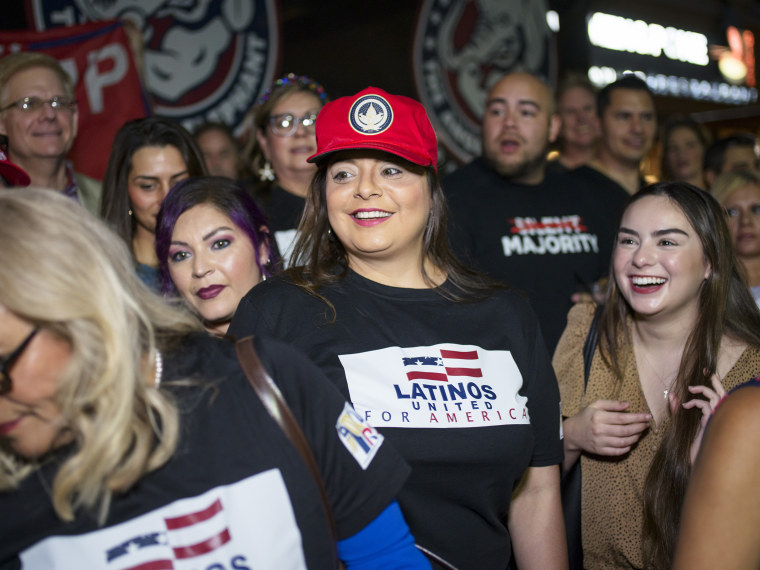National Republicans are planting another stake in the Rio Grande Valley city of McAllen, Texas, a Democratic stronghold that elected a GOP Latino mayor this summer.
The Republican National Committee planned to open what it is calling a Hispanic Community Center on Tuesday in McAllen, a U.S.-Mexican border city, part of its Latino engagement effort for next year’s midterm elections.
It’s the fourth such office that Republicans have opened. The first was in Laredo, Texas, also on the border. The others opened in Milwaukee and Doral, Florida, where the largest Latino groups have Venezuelan, Colombian and Cuban roots.
Another center is planned for San Antonio.
The centers are an attempt by the national GOP to build on the expanded Latino vote share that former President Donald Trump snagged last year.
Latinos voted 2-to-1 for Joe Biden nationally, but Trump won the Latino vote in Florida and performed well in traditionally Democratic Latino counties in Texas, flipping a couple and improving his vote shares from 2016 in others.
Much of the Latino Republican support in the Rio Grande Valley started at a grassroots level. The national party is trying to continue the community connection by promoting the centers as gathering places, rather than election offices.
“They’re going to be community centers where people can come together to watch movies, hold religious services, to do many things, to give people in McAllen and in these other cities a space to be able to enjoy each other and also to talk about a common ideology,” said Macarena Martinez, the RNC’s Texas spokeswoman.
She said movies and other events will be bilingual.
Trump won 41 percent of the vote in Hidalgo County, where McAllen is located and where about 92 percent of the population is Latino. About 84 percent of McAllen’s approximately 144,700 residents are Latino.
“What we saw last cycle is the Democrats launched an extremely aggressive defund the police, anti-law-and-order narrative, which does not appeal to Hispanics and especially does not appeal to Hispanics down at the border whose family members or cousins are Customs and Border Patrol agents, whose family are officers,” Martinez said.
McAllen, the largest city in Hidalgo County in the center of the Rio Grande Valley, grew over the past decade. About a quarter of its population lives in poverty.
The largest economic driver in McAllen, a commercial hub on the border, is the health care sector, a top employer. It is the third busiest border crossing for trucks and pedestrians in Texas, according to the Federal Reserve Bank of Dallas. Retail also is an important industry, attracting business from the Rio Grande Valley and from across the border.
In a runoff in June, Javier Villalobos, a Republican, won the mayor’s race by a couple of hundred votes. The position is nonpartisan; Villalobos is a former Hidalgo County GOP chairman.
Democrats’ decision not to campaign door to door while the coronavirus was raging may have contributed to Trump’s showing with Latinos on the border. Democrats also focused on more competitive areas of the state.
Lucas Acosta, a spokesman for the Democratic National Committee, said the GOP is a latecomer. Democrats have been and will continue to be on the ground in the region “organizing Latino voters and ensuring Republicans can’t run away from their extremist record,” he said.
Acosta said Democrats are reminding Latino voters that the American Rescue Plan, Biden’s coronavirus relief legislation to create jobs, lower costs for families and “lead us out of this pandemic,” passed without a single Republican vote.
“Democrats will keep fighting for Latino families and will continue to do the grassroots work in the Rio Grande Valley to ensure voters see how Democrats are delivering for them,” Acosta said.
Gilberto Hinojosa, the chairman of the Texas Democratic Party, said Democrats must respond with more investment.
“The problem we’ve always had in the past is there is limited resources coming into the state of Texas, from outside and from within, and most of those resources have been spent where there are swing districts, like the Dallas-Fort Worth area and where several state House seats were in contention,” he said.
The Rio Grande Valley has depended mostly on local county organizations to deliver the vote, but many counties have not had seriously competitive races, meaning there was very little money to push turnout, Hinojosa said.
Proposed state GOP redistricting changes that would make some state and federal seats more competitive could open a door for more Democratic investment, he said.
The state party has hired a regional political manager for the Rio Grande Valley and another for other parts of South Texas, and it is putting more money into voter registration.
“We see this as a challenge and opportunity,” Hinojosa said.
The community center follows other Republican activity in South Texas since the election.
“What we saw during the 2020 election cycle was a Hispanic shift to the GOP in larger numbers than ever before, so we are looking to make further effort with these communities for everyone to realize, at the end of the day, Hispanics and Republicans have a common ideology,” said Martinez, the Republican spokeswoman.
Follow NBC Latino on Facebook, Twitter and Instagram.

